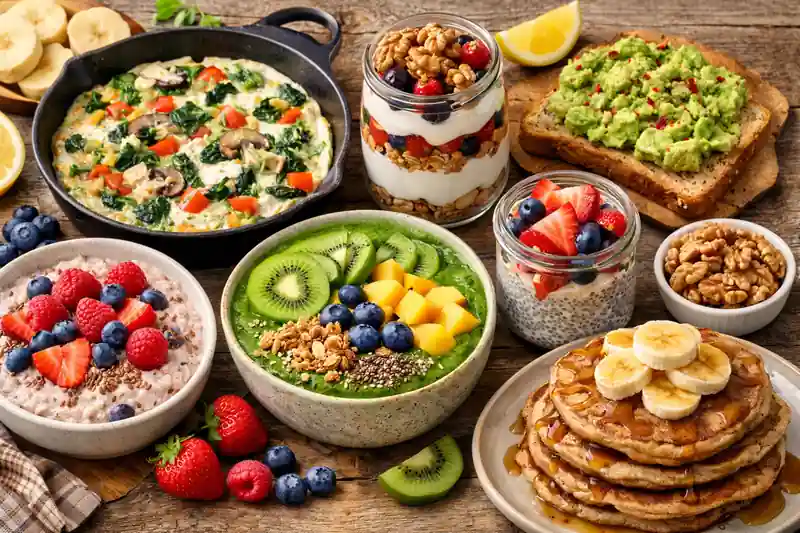Quick Anti-Inflammation Breakfast Guide for Wellness

When you wake up feeling stiff, tired, or just generally run down, your first meal of the day holds incredible power. Chronic inflammation is often the hidden culprit behind many uncomfortable symptoms. It’s not the short-term swelling from a cut, but a deep, long-term cellular problem linked to issues like weight gain, GI distress, fatigue, and chronic conditions like rheumatoid arthritis (RA) and heart disease.
Fortunately, managing chronic inflammation starts right at the breakfast table. By choosing the right mix of whole, nutrient-dense foods, you gain your first opportunity to calm your immune system and set a positive, energized tone for the hours ahead.
This comprehensive guide will walk you through crafting the ultimate anti-inflammation breakfast. We will look at the foundational nutrients you need, which common breakfast items sabotage your health, and offer simple, actionable recipes that taste great and leave you feeling nourished and refreshed.
The Pillars of an Anti-Inflammation Breakfast
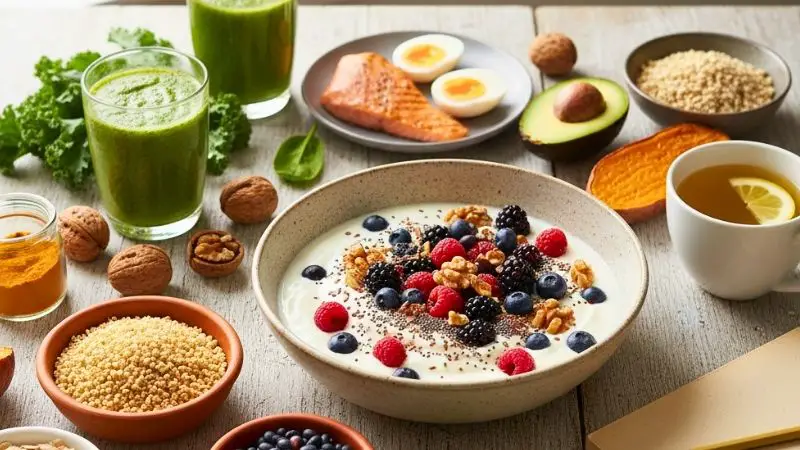
If you are dealing with chronic inflammation, your main goal in eating should be to consume fewer processed, refined foods and sugars and instead focus on whole, nutrient-dense ingredients. An effective anti-inflammatory meal should be balanced to support sustained energy without causing blood sugar spikes.
What specific ingredients should anchor your morning meal? These five key components are essential for a powerful anti-inflammation breakfast:
A. Antioxidants and Phytonutrients
Antioxidants are compounds that protect your cells from damage caused by unstable molecules called free radicals. These powerful plant compounds are essential for fighting inflammation.
- Key Sources: Berries (like raspberries, blueberries, and blackberries), leafy greens (like kale and spinach), green tea, turmeric, and brightly colored vegetables.
B. Quality Protein (Aim for 15+ Grams)
Protein is critical for satiety (feeling full), stabilizing blood sugar, and repairing tissues. High-quality sources of protein contain all nine essential amino acids needed to build and repair tissues, regulate immune responses, and produce anti-inflammatory compounds.
- Key Sources: Eggs, Greek yogurt, kefir, lean meats (if tolerated, look for high-quality or grass-fed options), beans (like black beans), quinoa, and tofu.
C. Omega-3 Fatty Acids
Omega-3 fats are powerful compounds that help the body resolve inflammation. They are crucial for improving overall health and managing symptoms of inflammatory conditions.
- Key Sources: Fatty fish (like salmon), walnuts, chia seeds, flaxseeds, and avocado. Adding ground flaxseed to a recipe offers omega-3s and fiber.
D. Fiber
Fiber is vital because it aids digestion, promotes gut health, and plays a role in regulating inflammation. Fiber helps stabilize blood sugar, ensuring sustained energy without rapid spikes.
- Key Sources: Whole grains, vegetables (like sweet potatoes, broccoli, and acorn squash), legumes (like black beans), nuts, and seeds. Many of these ingredients contribute both soluble and insoluble fiber for multiple health benefits.
E. Probiotics
Probiotic foods contain live cultures that promote a healthy gut microbiome. Since the gut is closely connected to the immune system, fostering gut health influences immune response and helps modulate inflammation levels throughout the body.
- Key Sources: Fermented dairy products like Greek yogurt and kefir.
Pro-Inflammatory Breakfast Foods to Avoid

A helpful anti-inflammation breakfast strategy involves not just adding beneficial foods, but also removing ingredients that actively trigger inflammation. These foods commonly cause blood sugar spikes or are high in fats that promote an inflammatory response.
A. Refined Carbohydrates and Added Sugars
Foods high in refined carbohydrates and sugar cause blood sugar levels to spike rapidly, which triggers an inflammatory response in the body.
- Worst Offenders:
- Pastries: Muffins, doughnuts, and croissants are notoriously high in refined carbs and sugar. Croissants are also high in saturated fats.
- Pancakes and Waffles: These are typically made with white flour, leading to a high glycemic index and increased inflammation.
- Sugary Drinks: Blended coffees often contain excessive sugar, which the body tries to store in fat cells, potentially leading to weight gain and insulin resistance.
- Anti-Inflammatory Substitutes: If you enjoy pancakes, waffles, or muffins, you can swap refined white flour for fiber-rich oat flour or whole-wheat flour. Adding ingredients like high-protein chia seeds, antioxidant-rich blueberries, and using extra-light olive oil can make them more nutritious and less inflammatory. Instead of sugary blended coffees, use unsweetened plant-based milk and sweeten naturally with a touch of maple syrup or cinnamon.
B. High-Saturated-Fat and Processed Meats
Diets that are heavy in saturated fats can promote inflammation and raise cholesterol. Processed breakfast meats are major contributors to this issue.
- Worst Offenders: Bacon, sausage, and other processed breakfast meats provide little benefit and may hurt your health in the long term.
- Anti-Inflammatory Substitutes: Try using high-quality or grass-fed chicken and beef, or look for plant-based breakfast meat alternatives that are low in sodium and made with whole-food ingredients.
C. High Glycemic Index Foods and Unstable Oils
Foods with a high glycemic index (GI) cause rapid blood sugar spikes, increasing inflammation. Cooking with the wrong oils can also undermine your anti-inflammatory efforts.
- Worst Offenders: White potatoes, especially when fried as home fries.
- Unstable Oils to Avoid: Vegetable oil or soybean oil degrades when exposed to heat and should be avoided in cooking.
- Anti-Inflammatory Substitutes: Choose complex carbohydrates like sweet potatoes (which are rich in beta-carotene and have a lower GI), brown rice, or quinoa. For cooking, use heat-resistant avocado oil or extra-light olive oil.
Anti-Inflammation Breakfast Ideas (Quick Recipes)
Starting your day with a satisfying, whole-food meal does not have to be complicated or time-consuming. These ideas focus on maximum anti-inflammatory benefits with minimal prep time, making them ideal for managing chronic symptoms.
A. High-Protein Smoothies & Bowls
Smoothies are a fantastic way to pack a massive dose of antioxidants, fiber, and protein into a quick, creamy drink. Using frozen fruit is key to yielding a creamy, frosty base.
1. Anti-Inflammatory Cherry-Spinach Smoothie (5 Minutes)
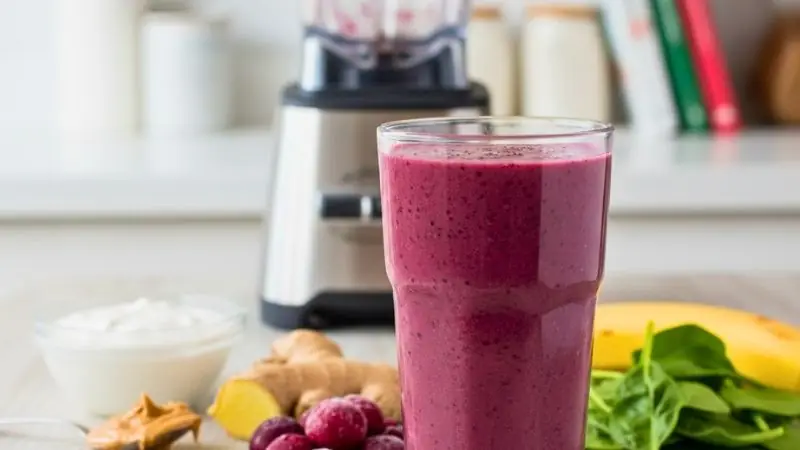
This recipe is a powerhouse, boosting anti-inflammatory foods with compounds that can lower the inflammatory marker C-reactive protein.
Ingredients (Serves 1):
- 1 cup non-dairy milk (almond or cashew is a great option)
- ½ cup frozen berries (cherries are highly effective)
- 1 cup dark leafy greens (spinach or kale)
- ½ cup creamy gut-friendly kefir
- 1 tablespoon chia seeds (for heart-healthy fats)
- 1 tablespoon almond butter (for protein and healthy fats)
- ½ frozen banana or avocado (for creaminess)
- Fresh ginger (for gingerol, which may improve inflammatory markers)
Step-by-Step Guide:
- Combine the non-dairy milk, leafy greens, kefir, frozen fruit, chia seeds, almond butter, and ginger in a high-speed blender.
- Blend until completely smooth, ensuring no chunks of leafy greens remain.
- Pour into a glass and enjoy immediately. Tip: Portion out all dry ingredients and frozen items into freezer bags the night before for ultra-fast assembly.
2. Raspberry-Peach-Mango Smoothie Bowl (5 Minutes)
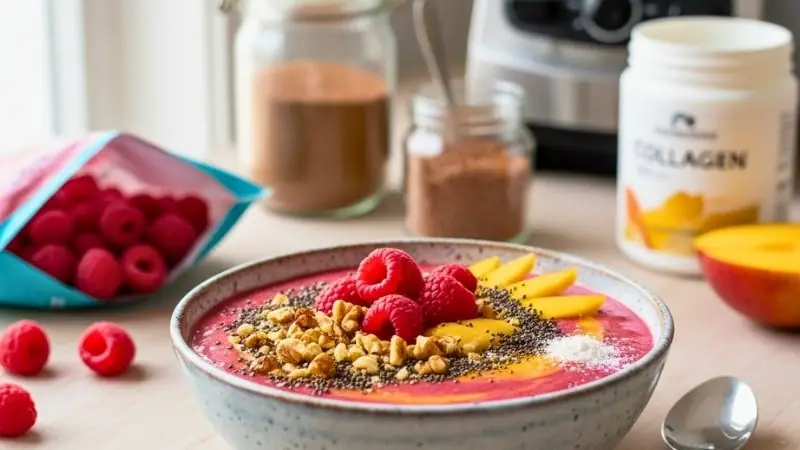
Smoothie bowls offer a thick, frosty base perfect for adding crunchy, anti-inflammatory toppings like nuts and seeds.
Ingredients (Serves 1):
- 1 cup non-dairy milk (like almond or coconut)
- ½ cup frozen raspberries
- ½ cup frozen peaches
- ½ cup frozen mango
- 1 tablespoon ground flaxseeds (for omega-3s and fiber)
- 1 scoop collagen powder or protein powder (optional, for gut repair and protein boost)
- Optional: Nut butter for added protein.
Step-by-Step Guide:
- Combine frozen fruits, milk, and ground flaxseeds in a powerful blender.
- Blend until a thick, creamy texture is achieved (use frozen fruit to ensure this texture). You may need to stop and scrape down the sides.
- Pour the mixture into a bowl.
- Top with anti-inflammatory ingredients like chia seeds, chopped walnuts, or fresh berries.
B. Savory & Protein-Rich Plates
Savory breakfast options often deliver high protein and healthy fats, ensuring you stay satisfied for hours.
3. Fluffy Turmeric Eggs (5-10 Minutes)
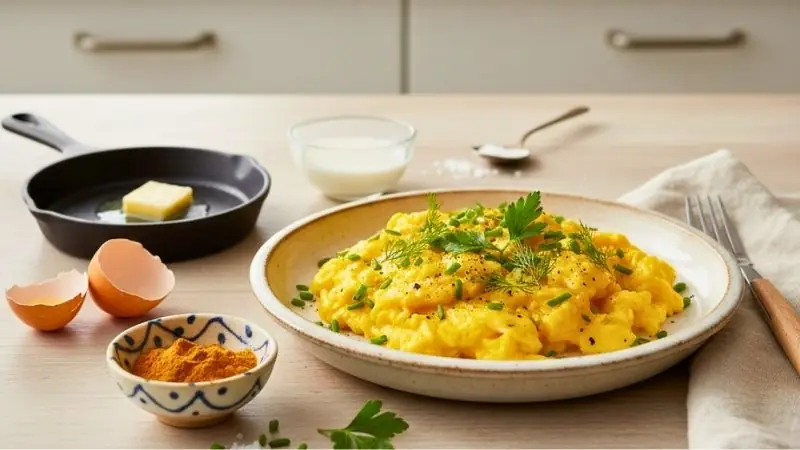
Turmeric contains curcumin, which is one of the strongest natural anti-inflammatories. Pairing it with eggs, which offer high-quality protein and vitamin D, creates a powerhouse meal.
Ingredients (Serves 1):
- 2 eggs (a high-quality source of protein)
- 2 tablespoons milk of choice (dairy or non-dairy)
- ¼ teaspoon ground turmeric (contains curcumin)
- Pinch of salt and pepper
- 1 tablespoon pastured butter or ghee (or heat-resistant avocado oil)
- Garnish: Chives, parsley, and/or dill.
Step-by-Step Guide:
- Whisk together eggs, milk, and spices, including the turmeric.
- Melt the butter or oil in a skillet over medium heat.
- Add the egg mixture to the skillet and lightly scramble.
- Once cooked, transfer to a plate and garnish with fresh herbs.
4. Spinach & Egg Scramble with Raspberries (10 Minutes)
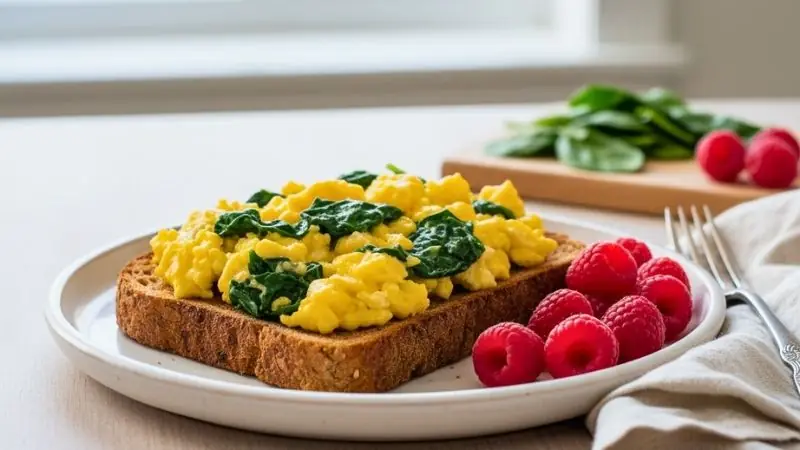
This balanced meal combines high-quality protein from eggs, fiber from whole-grain toast, and antioxidants from spinach and berries.
Ingredients (Serves 1):
- 2-3 eggs, scrambled
- 1/2 cup fresh spinach, sautéed or mixed into the eggs
- 1 slice whole grain toast (choose whole grain to stabilize blood sugar)
- 1/2 cup raspberries or other fresh berries (for antioxidants and fiber)
Step-by-Step Guide:
- Toast the whole-grain bread.
- Scramble the eggs, adding spinach toward the end of cooking until wilted.
- Serve the eggs on the toast with a side of raspberries.
C. Easy Overnight Options
Overnight options are excellent for busy mornings because they leverage overnight chilling time, making the morning routine stress-free.
5. Chia Seed Pudding with Berries (2 Minutes Prep)
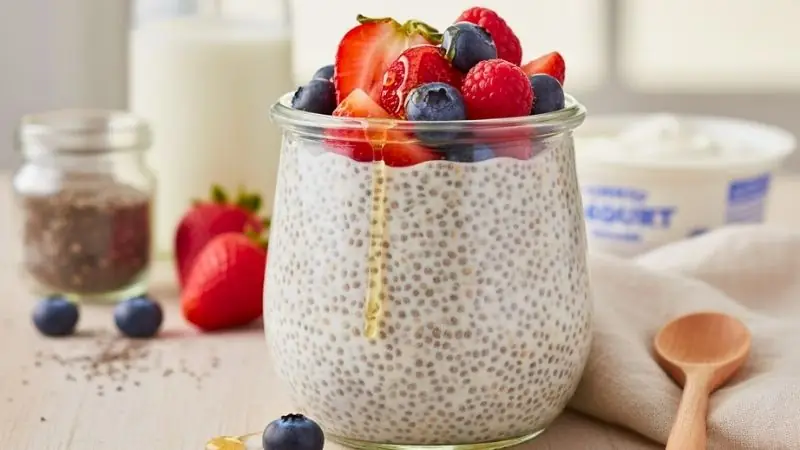
Chia seeds are an abundant source of anti-inflammatory omega-3 fatty acids, high in fiber for gut health, and contain plant-based protein. This meal is also naturally low-sugar and nutrient-dense.
Ingredients (Serves 1):
- 3 tablespoons chia seeds (high in omega-3s)
- ½ cup unsweetened non-dairy milk (like aalmond or ssoy milk
- ¼ cup plain Greek yogurt (for probiotics and extra protein)
- Sweetener (optional): A touch of honey or maple syrup
- Topping: Fresh berries (like strawberries, blueberries, or raspberries).
Step-by-Step Guide (Prep Night Before):
- In a small bowl or airtight jar, combine the chia seeds, non-dairy milk, Greek yogurt, and sweetener (if using).
- Stir well to fully incorporate the chia seeds and prevent clumping.
- Cover the mixture and let it sit overnight in the refrigerator.
- In the morning, top the thickened pudding with fresh berries and enjoy.
Meal Preparation Tips for Busy Mornings
Consistency is key to reducing inflammation, and meal prepping ensures you always have a quick, healthy anti-inflammation breakfast ready.
A. Utilize Overnight Options
- Chia Pudding & Oats: Use recipes like the Chia Seed Pudding or Apple Cinnamon Overnight Oats. Combining ingredients into an airtight container and refrigerating while you sleep makes mornings much simpler.
- Frozen Smoothie Bags: Portion out your fruits, greens, and powdered add-ins (like flaxseed or protein powder) into freezer bags. In the morning, simply dump the contents into the blender, add liquid, and blend until creamy.
B. Batch Cooking Components
- Cook Complex Carbs Ahead: Prepare foods with longer cook times, such as grains (like quinoa or brown rice) and sweet potatoes, in advance. Once cooked and cooled, slice or portion them and store them in an airtight container for easy addition to breakfast bowls.
- Simplify Veggie Prep: Pre-chop vegetables like peppers, onions, and spinach the night before. This allows you to quickly toss them into omelets, scrambles, or egg bites without hassle.
C. Freeze for Convenience
- Freeze Egg Dishes: Make large batches of breakfast burritos (using whole grain tortillas and black beans), frittatas (like Zucchini and Spinach Frittata), or egg bites (like Kale and Onion Egg Bites made with Cottage Cheese). Freeze them, then reheat in the microwave for two to four minutes on busy mornings.
D. Stock Up on Anti-Inflammatory Staples
- Keep Frozen Berries in Stock: Frozen berries are easy toppers for yogurt parfaits, pancakes, or chia puddings. They are rich in inflammation-fighting antioxidants.
- Stock Neutrally Flavored Frozen Veggies: Frozen broccoli, spinach, and cauliflower are nutrient-rich additions to smoothies and won’t overpower the flavor.
Addressing Common Anti-Inflammation Breakfast Choices and Variations
Achieving a successful anti-inflammation breakfast is about balance and personalized choices. Many traditional breakfast favorites can be modified to meet anti-inflammatory guidelines.
Avocado Toast Reinvented
Traditional avocado toast is often too low in protein to keep blood sugar stable.
- Solution: Toast a slice of whole-grain or sprouted bread. Top with mashed avocado (rich in healthy monounsaturated fats) and a sliced tomato (high in lycopene). Boost protein by adding a fried or scrambled egg, or adding a layer of labneh (yogurt cheese) or chopped firm tofu. Sprinkle with nuts like pistachios or seeds.
Yogurt Parfaits Upgraded
Yogurt is a great breakfast choice, but the type matters.
- Solution: Choose plain Greek yogurt for a high-quality protein punch and live probiotic cultures that support gut health. Layer the yogurt with handfuls of fresh berries (antioxidants) and raw nuts (healthy fats). Avoid added sugars and processed granola; opt for whole-food alternatives like rolled oats or chopped nuts instead.
The Benefits of Savory Bowls
Savory bowls are highly effective because they naturally combine multiple anti-inflammatory components. The High-Protein Anti-Inflammatory Breakfast Bowl, for example, combines roasted vegetables (acorn squash, broccoli, beets), black beans, quinoa (complete protein), and an egg for a massive dose of fiber (16 grams) and 21 grams of protein.
- Modification Tip: If you want a quick option, layer roasted sweet potato slices, arugula, small black lentils, and a hard-boiled egg. Top with pumpkin seeds, which are good sources of Vitamin E and zinc.
Conclusion: Starting Your Day Strong
Chronic inflammation can be overwhelming, leading to aches, pain, and fatigue, but integrating an anti-inflammatory breakfast into your daily life is a powerful, actionable step toward wellness. By prioritizing whole foods, focusing on high protein, and maximizing your intake of omega-3 fats, fiber, and antioxidants, you are actively giving your body the tools it needs to resolve inflammation and repair itself.
Remember, healthy eating does not have to be boring or time-consuming; it just requires simple shifts. Whether you choose a quick, nutrient-dense smoothie or a satisfying savory egg dish, starting your day with intention and the right ingredients can significantly improve your energy, manage chronic symptoms, and promote overall health.
7 Sources:
Noble Home Remedies relies on peer-reviewed studies, academic research institutions, and medical associations for accuracy and reliability while avoiding tertiary references. Our editorial policy provides more information about how we ensure our content is accurate and up-to-date.
- 14 High-Protein, Anti-Inflammatory Smoothie Recipes
https://www.eatingwell.com/gallery/8053593/high-protein-anti-inflammatory-smoothies/ - 5 Anti-Inflammatory Breakfast Ideas for Rheumatoid Arthritis
https://rheumatologistoncall.com/2023/09/18/5-anti-inflammatory-breakfast-ideas-for-rheumatoid-arthritis/ - The 7 Worst Breakfast Foods for Inflammation
https://www.everydayhealth.com/food-ingredients/unhealthy-breakfast-foods-that-cause-inflammation/ - 9 Anti-Inflammatory Breakfast Ideas to Kickstart Your Day
https://www.health.com/anti-inflammatory-breakfast-11774313 - Mediterranean Diet – 14 Quick 10 Minute Breakfasts to Help Fight Inflammation
https://www.czen.org/mediterranean-diet-14-quick-10-minute-breakfasts-to-help/ - Anti-Inflammatory 3-DAY MEAL PLAN
https://centrespringmd.com/wp-content/uploads/2022/05/Anti-Inflammatory-Guide.pdf - The Best High-Protein Breakfast to Reduce Inflammation, According to Dietitians
https://www.eatingwell.com/best-high-protein-breakfast-to-reduce-inflammation-11740852
Trust in your purchase:
Every product featured on our site has been carefully researched and selected based on quality, customer ratings, and positive reviews to ensure you receive excellent value for your money.
Please note:
This post contains affiliate links. If you make a purchase through these links, we may earn a small commission at no additional cost to you. This helps support our site and allows us to continue bringing you valuable content. Thank you!
Thank you for your precious time spent with NobleHomeRemedies.
You may also like:
Black Mold on Window Sills: Removal and Prevention
Black Mold on Window Sills: Removal and Prevention Have you ever noticed the black mold…
Fordyce Spots vs Pimples
Fordyce Spots vs Pimples: 5 Disturbing Misconceptions Have you ever noticed small, white bumps on…
How Long Does Nyquil Stay In Your System?
How Long Does Nyquil Stay In Your System? Find the Answer This article covers the…
Breakfast Recipes for High Blood Pressure
7/20 Delicious Low Sodium Breakfast Recipes for High Blood Pressure (Part 1: Breakfasts) Medical Disclaimer:…
Insulin Injection Sites – Learn how to Inject – Type1 & Type2 Diabetes
Insulin Injection Sites – Learn how to Inject – Type1 & Type2 Diabetes What are…
Home Remedies for Body Odor
10 Best Home Remedies for Body Odor Mild body odor is common in people; however,…




